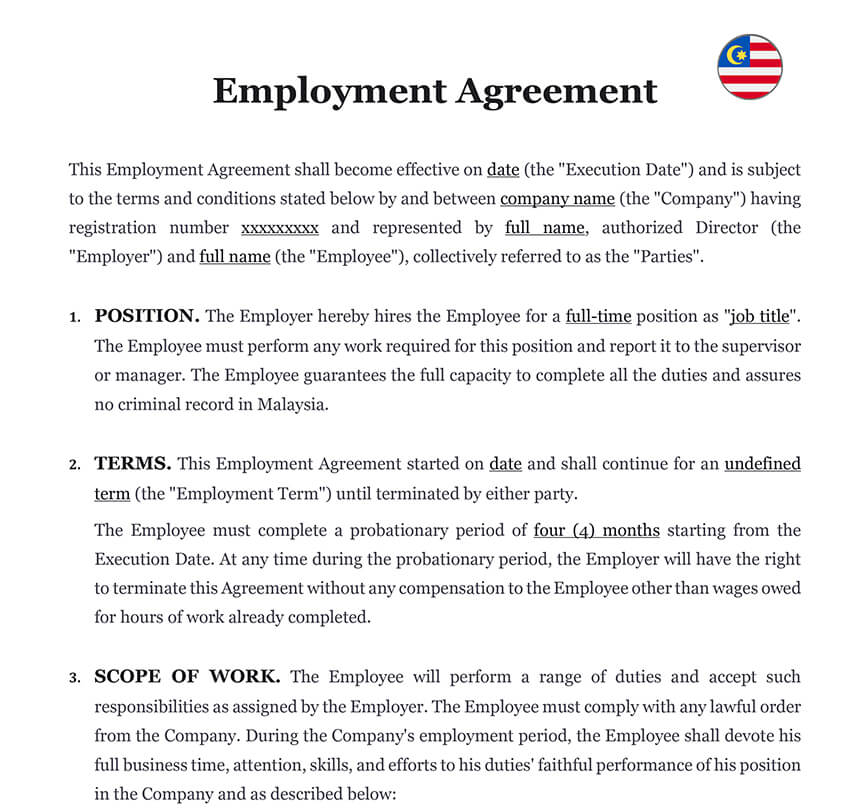Understanding the basics of labor law
Labor law in Malaysia is a body of legislation that governs the rights and obligations of employees and employers in the workplace. The primary legislation governing labor law in Malaysia is the Employment Act 1955, which sets out the minimum terms and conditions of employment for most categories of workers in the private sector. This includes requirements such as minimum wage, working hours, and leave entitlements.
Employers in Malaysia are also subject to a range of other laws and regulations, including the Industrial Relations Act, which regulates the resolution of disputes between employers and employees, and the Occupational Safety and Health Act, which sets out workplace health and safety requirements. Understanding these laws is crucial for both employees and employers to ensure fair and safe working conditions.
The importance of labor law in Malaysia
Labor law plays a crucial role in protecting the rights of employees and employers in Malaysia.
| ➤ It ensures that employees are treated fairly and have access to basic entitlements such as minimum wage, leave, and working hours. Employers, on the other hand, are required to comply with legal requirements related to employment, including provisions related to employee safety and health. |
| ➤ Additionally, labor laws help to resolve disputes between employers and employees through mechanisms such as arbitration and mediation, thereby promoting harmonious and productive working environments. |
| ➤ Labor law in Malaysia is also important in attracting foreign investment and improving the country's economic growth. |
| ➤ By creating a stable and secure business environment, labor law provides the foundation for businesses to thrive, leading to increased employment opportunities and economic development. |
Overall, the importance of labor law in Malaysia cannot be overstated as it serves as a cornerstone for social justice and economic progress.

Navigating employment contract
Navigating an Employment Contract can be a complex process, as there are a number of legal requirements and considerations to keep in mind.
It is important to carefully review all terms and conditions of the contract before signing, as this document will govern the relationship between the employer and employee throughout the period of employment. Key terms to look out for include salary, working hours, leave entitlements, and job responsibilities.
It is also important to ensure that the contract complies with all relevant labor laws and regulations in Malaysia.
Additionally, employees should be aware that they have the right to negotiate the terms of their contract with their employer, and should not hesitate to request changes if they are not satisfied with the initial offer.
ℹ️ Navigating an employment contract in Malaysia requires careful attention to detail and a good understanding of labor laws and regulations.
Minimum wage and working hours
The minimum wage and working hours of employees are governed by the Employment Act 1955
As of January 2022, the minimum wage rate in Malaysia is RM1,200 per month for Peninsular Malaysia and RM1,100 per month for Sabah, Sarawak, and Labuan. The act also provides guidelines for working hours, which state that employees should not be required to work more than eight hours per day or 48 hours per week.
Additionally, employees are entitled to at least one rest day per week, and any work done on a rest day should be compensated at a rate of at least 1.5 times the employee’s ordinary rate of pay. These requirements apply to most categories of employees, although there are some exceptions for certain industries or types of work.
Overall, the minimum wage and working hours regulations in Malaysia are designed to ensure that employees are treated fairly and have access to basic entitlements.
ℹ️ Employers in Malaysia are required to comply with these minimum standards, and failure to do so may result in legal penalties or fines.
Employee benefits and protections in Malaysia
Employees are entitled to a range of benefits and protections under the law.
1. These include minimum wage and working hours requirements, as well as entitlements to annual leave, sick leave, and public holidays.
2. In addition, female employees are entitled to 14 weeks of paid maternity leave, while male employees are entitled to a few days of paternity leave.
3. The Employment Act 1955 also provides protections against unfair dismissal, discrimination, and workplace harassment.
4. In the event of a dispute, employees have access to mechanisms such as the Industrial Relations Department and the Labor Court to resolve their complaints.
5. Employers are required to contribute to the Employee Provident Fund (EPF), which is a social security scheme that provides retirement benefits to employees.
6. Employers are also required to provide a safe working environment and ensure compliance with health and safety regulations.
These employee benefits and protections in Malaysia are designed to promote fair and safe working conditions, and to ensure that employees are treated with dignity and respect in the workplace.
Resolving disputes in the workplace
Disputes between employers and employees are typically resolved through a combination of mediation, arbitration, and litigation. The Industrial Relations Department provides mediation services to help resolve disputes between employers and employees, and the department can also refer unresolved disputes to the Labor Court for adjudication. The Labor Court has the power to make legally binding decisions and awards, and its decisions can be enforced through the courts.
In addition to these mechanisms, employees may also have the right to seek recourse through civil courts or other regulatory bodies, depending on the nature of the dispute. It is important for both employers and employees to follow the proper procedures when raising and resolving disputes, as failure to do so can result in legal penalties or fines.
The dispute resolution mechanisms in Malaysia are designed to provide a fair and efficient means of resolving disputes between employers and employees.
In conclusion, labor law plays a critical role in shaping the relationship between employers and employees in Malaysia. By providing guidelines and regulations for working conditions, compensation, and dispute resolution, labor law protects the rights of workers while also ensuring that employers can run their businesses fairly and efficiently. As an employee or employer in Malaysia, it is important to understand the nuances of labor law in order to comply with legal requirements. Don’t hesitate to contact our lawyers to avoid potential legal issues. By keeping up to date with the latest developments in labor law, individuals and businesses can ensure that they operate within a fair and just legal framework.











